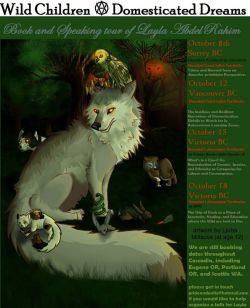Vancouver, Unceded Coast Salish Territories
The Ingrained Premises of Injustice in the Unknowledge Sold as Education
A discussion with Layla AbdelRahim at Spartacus:

7:00pm
- 9:00pm
Saturday October 12 2013
» More information
In this discussion, Layla will draw on the research conducted for her book Wild Children –Domesticated Dreams: Civilization and the Birth of Education, in which she examines the underlying premises in the construction of knowledge that the institution of education produces and proliferates. The first premise is that knowledge of others must be organised and based on “classification” of forms of life and nonlife. Hence, in monotheistic narratives, God creates groups of beings on different days and, in science, classification is the primary organising principle of knowledge. Knowing the self and the world by relating to individuals as members and representatives of an epistemological “class” fosters alienation from and ignorance of the real experiences of others and provides a system of oppression of whole groups of human and nonhuman beings. In other words, epistemological classification establishes economic classes, where some control the power and agency over the construction of “knowledge” while the others constitute “resources” to be domesticated and colonised by such knowledge and exploited as labour force and the source of pleasure and well-being for the “ruling” classes. Therefore, examining and critiquing how unknowledge about what is human or nonhuman is produced and reproduced through schooling and other cultural narratives is critical to overcoming gender, racial, and speciesist oppression.
---------------------------------------------------------------
Spartacus Books is on the ground/street level. Both the outer door and the bathroom door are 800mm (31.49 inches) in width. In the gender neutral bathroom, there is one bar directly to the left of the toilet and one bar directly behind it. The inside of Spartacus is all one level except for a slight bump (about 1mm in height) close to the back.
The site for the Vancouver local of The Media Co-op has been archived and will no longer be updated. Please visit the main Media Co-op website to learn more about the organization.